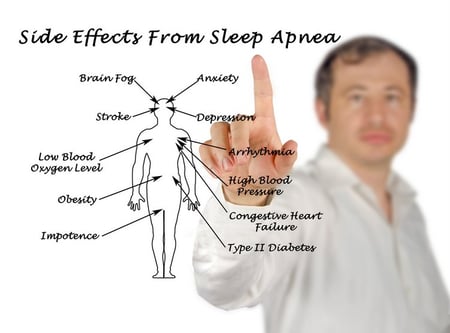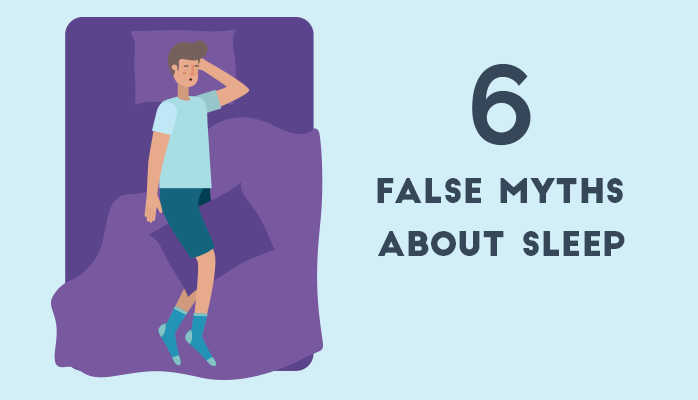The 6 Myths of Sleep
Sleep myths abound on social media, in memes, advice from parents, and from friends. Unlike many myths which can be harmless, sleep myths may actually lead to changes that can be pretty harmful.
While there are certainly more than six myths about sleep, here are the six that are probably most commonly purveyed:
Myth 1: If You Can’t Sleep, Just Stay in Bed Longer
Most healthy sleepers take around 15 minutes to fall asleep. Certain sleep changes may actually cause you to fall outside of this normal window, including:
- Insomnia
- Stress
- Anxiety
- Depression
The above points are just some of the many things that can keep you awake in bed. But simply staying in bed and trying to will your way to sleep, when your body clearly isn't going to comply is not helpful either. All it does it teach your body to associate wakefulness with bed.
The conclusion? If you can’t sleep, get out of bed and do something different. Preferably, go into another room to do something different. “Different” should not involve screen, as they emit blue light that keep you up. Instead, do something mellow like:
- Meditating
- Yoga
- Reading
- Writing
Myth 2: Snoring Is Just Annoying
 Snoring might be annoying for bed partners and guests, or it could involve serious mitigation like ear plugs, but it’s not always harmless. Chronic snoring, especially socially unacceptable snoring, is a primary sign of obstructive sleep apnea.
Snoring might be annoying for bed partners and guests, or it could involve serious mitigation like ear plugs, but it’s not always harmless. Chronic snoring, especially socially unacceptable snoring, is a primary sign of obstructive sleep apnea.
Obstructive sleep apnea (OSA) is a condition where you continuously stop breathing and then have to rouse yourself into wakefulness in order to start breathing again. You won’t remember waking up, but the effects will remain the same: sleep deprivation.
The stop-breathing/wake-up cycle is called an apnea. This can happen dozens to hundreds of times per night, causing mild to severe sleep apnea.
Myth 3: Some People Are Fine on Less Than 6 hours of Sleep
We’ve all heard people say that they can survive on five hour of sleep. However, the survival is short-term and comes with a host of consequences.
The accepted standard for everyone is that 7-9 hours of sleep is ideal. While one may only sleep for 5 hours at a time, the extra sleep will need to be made up for in the form of naps, or else one may suffer from sleep deprivation.
While someone might still be able to live on 5 hours of sleep, optimal functioning is at least 7 hours. Less than that results in poorer performance physically, mentally, and cognitively.
Myth 4: Hitting the Snooze Button is Worth It
Here’s an unfortunate fact, you might hit the snooze button but it won’t get you any more quality sleep – you will spend “snooze” time simply at a low level of sleep. You may as well just get up – even if it’s hard!
Myth 5: TV is a Good Way to Fall Asleep
Tune in, relax, zone out, and finally fall asleep. Countless people fall asleep to this rhythm. Unfortunately, TVs and screens don’t help you – if your goal is to get good sleep then you should turn off the TV and shut your computers [Sleep.org].
For one, TVs screens emit blue light that delays and suppresses melatonin. Then there is the problem that TV and videos can emit unnatural, jarring noises that temporarily wake you up, even if you don’t remember waking up in the morning.
If you are one of the people who enjoys having “noise” to fall asleep to, consider getting a fan, small water feature in your room, or other form of white noise that is more natural and more soothing.
Myth 6: A Night Cap Is Good for Sleep
If you are like many people, maybe even most people, a nightcap before bed is not uncommon. After all, a drink does help us relax and fall asleep. Unfortunately, while it may make you go to sleep, it will result in significantly reduced quality of sleep:
- It disrupts REM sleep, which is important for memory and learning
- Alcohol is a diuretic, meaning you are more likely to wake up in the middle of the night to use the restroom
Alcohol should be avoided in the hours leading up to bed. If you are used to having a nightcap before bed, you will likely experience a noticeable difference in wakefulness in the morning if you cut out your nightcap.
If you are struggling with sleep deprivation, you should take this free online sleep test and see how you might begin the road to healthy sleeping:


